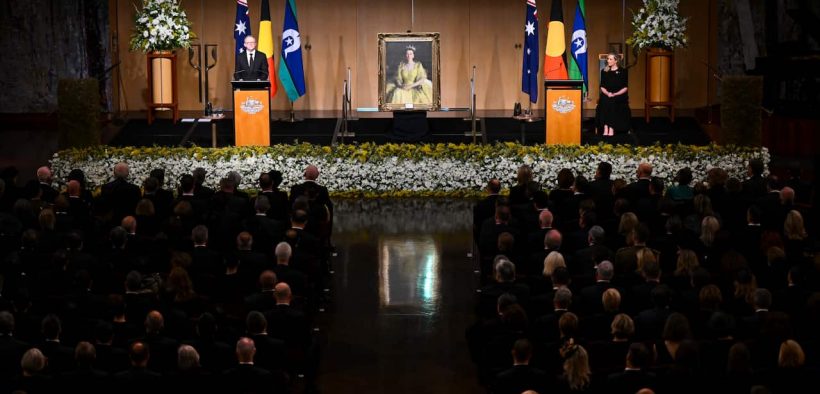Queen Elizabeth II has been remembered across Australia as an example of “tireless and selfless service, devotion to duty, and compassion for others”.
A crowd of almost 700 people, which included former prime ministers, judges, military chiefs and other dignitaries gathered at Parliament House in Canberra for a national memorial service, on a one-off public holiday for the late monarch.
“Throughout her reign she constantly demonstrated tireless and selfless service, devotion to duty, and a compassion for others,” he said.
The Governor-General spoke of recently presenting to the Queen, via the now-King Charles III, a specially commissioned work of art combining the Queen Elizabeth II rose and the Australian wattle, in celebration of her platinum jubilee.
He acknowledged the Queen’s death had “prompted different reactions for some in our community”, noting the journey to reconciliation with First Nations people was one that Australia still needed to complete.

Prime Minister Anthony Albanese said the Queen did not seek to chase the times, but rather “held to qualities and virtues that are timeless”.
“Love of family, loyalty to country, service to community, kindness to those in need, respect for everyone she met,” Mr Albanese said.
He said monuments to the Queen dotted the Australian landscape, in almost every town and city.
Opposition leader Peter Dutton said there had never been a more “dignified monarch, dutiful leader or decent human” than the Queen.
Political leaders past and present, judges, military chiefs and other dignitaries were among guests at the televised service, which also featured a Bible reading, prayers, music and a floral tribute.

Inside the Great Hall, among the sea of black suits, dresses, hats and veils, was the bright orange of SES volunteers, the red of Scout uniforms, and blues and greens of school uniforms.
Australian singer Anthony Callea performed the national anthem.

The Queen died on 8 September aged 96, having reigned as Australia’s head of state for 70 years.
Twenty years ago she declared during a visit to Australia her “admiration, affection and regard for the people of Australia will remain, as it has been … constant, sure and true”.
She consulted with 16 prime ministers, and 16 governors-general served in her name.
All eight state and territory leaders were present, as were state governors, justices of the High Court and religious leaders.












